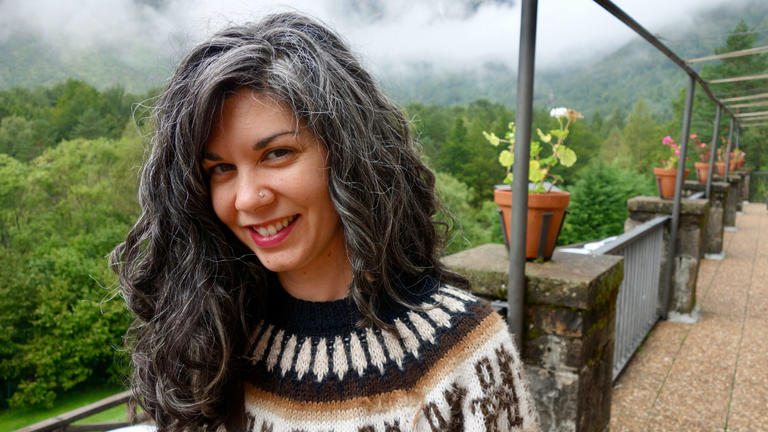
An Interview in Five Lines
Finding Text with Poet Sarah Heady
CIIS’ own Sarah Heady, Senior Grants Writer in the Development Department, has recently published a book of poetry entitled Comfort, which was a finalist for the 2017 National Poetry Series, among several other major prizes. We are proud to celebrate our staff, faculty, and students in their richly diverse creative endeavors; our community is what makes CIIS such a great place to be!
This is part two of an interview with Heady. It is an experimental interview that follows a version of her found-text method in which she reacts to her own poetic fragments as “found” language. Here she provides context for these excerpts based on their original intent as well as her current reaction, blurring the past and present just as her collection intentionally elides time and identity.
Check out part one of this interview.
Responses have been lightly edited for length and clarity.
is a hook, a hood, a helpmeet, a platform, a seeder, an arrow through topsoil saying come : is flax into bales, into rope, into twine, sacks, paper from straw, glass, starch, starch from maize, wheat, &c., canned fruits, potted meats, vegetables, blankets, woolens, carpets (cheap carpets), leathers & skins. how so many flourish in a place so young is quite a mystery to me
(poem also available in Contra Viento)
This is a good example of a straight pull from the magazine [Comfort, a women’s periodical] and other found sources like the “booster” documents, which were essentially long advertisements enticing White Easterners to come and settle the plains. The last line is definitely from one of the boosters—this is a “new” place. They claim nobody and nothing is there in the West. That’s obviously untrue. And yet how can these White settlements founded on violence and isolation be flourishing?
Craftwise, this piece exemplifies the work I did as a poet to create rhythm and motion with the found language, arranging it so you can feel a forward propulsion and momentum. That is also one of the inherent powers of the prose poem—with its condensed form, it leads you to read it quickly and breathlessly, all at once.
when i kiss you is it someone
later’s laugh
(poem also available in where is the river)
This one gets at a sense that when people have children, there’s a cascading series of events that comes from that union, and the weight of that. If you have a kid—and that kid has a kid—if you look all the way down the line, it’s mind-bending.
I hope that something the book does is toggle between a sense of big history and intimacy. It’s experimental, not confessional; it’s removed from me. It’s not about sharing personal experience, but about projecting this mass of women’s voices that are either being collapsed into the prose poem form or given room to breathe in the lineated poems. Either way, it’s meant to evoke a sense of big time and big historical movement.
artifice dropping into the natural : blending there
(poem also available in Fence)
One of the books that was the kernel of Comfort, even before I went to Nebraska and found the magazines, was Common Landscape of America, 1580-1845 by John R. Stilgoe (Yale, 1983). It’s a book about vernacular architecture and vernacular senses of space and place. One of the chapters is called “Artifice.” There was a received European distinction between artifice (e.g., mining, metalworking, making charcoal, firing in kilns, etc.), and “husbandry,” or agriculture, which was seen as more “natural”—though of course that’s hardly true. There was a gendered aspect to this binary, in that the realm of the natural was seen as “female” and the artificial as “male.”
Anyway, the conversation between the natural setting and the ways that humans transmute raw materials to create a life is what interests me. And in this historical work of settling, the farm labor was not as gendered as we might think. Everyone was doing the work. Everyone was getting their hands dirty.
she holds out only one hand, the other being immersed in
boiling water :
(poem also available in Ghost Proposal)
Boiling water is one of the main tools in cooking and cleaning, a major asset to domestic labor but dangerous, too. When I looked at the found texts of household tips and tricks I found in these women’s magazines, what I was attracted to often was the latent sense of danger in the materials of domesticity. There are sharp things, hot things, things that are poisonous. The contrast to a perceived softness or cozy passivity was interesting to me. When you make soap, you have to use lye; when you raise chickens, you have to cut their heads off; and when you boil water, your toddler might pull it off the stove. You have to be really careful. There's a lot of power in that danger, potentially.
is kneeling in the floating barn, picking through owl pellets. is separating fluff with her fingers, feeling for vole bones, stowing them in a tea tin for someone years later to ask herself why
(poem also available in Ghost Proposal)
This happened to me. There’s a place at Art Farm called the Floating Barn. It’s very open, without walls, just the bare skeleton of an old dilapidated barn. I went in there one day and found some owl pellets. I did keep some bones myself—they’re still on my dresser. It’s my little treasure.
In this context, for this anonymous woman, this is a purposeless act—it’s private, born of curiosity and not need. These bones aren’t going to be made into soup or used to build anything. It’s a private thing she’s doing. She’s drawn to the weirdness of this totemic object and she’s creating a treasure for herself. The interiority of that action and the inscrutability of that for someone who encounters it later—I don’t think she knows why she’s doing it, except for her own pleasure, her own interest. One of the questions the book asks is: isn’t that enough?
--
Check out part one of this interview.
